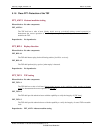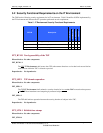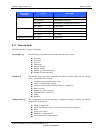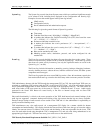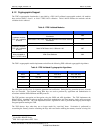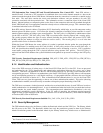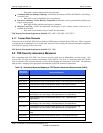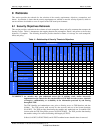
Security Target, Version 3.9
March 18, 2008
Nortel VPN Router v7.05 and Client Workstation v7.11
Page 45 of 67
© 2008 Nortel Networks
6.1.2 Cryptographic Support
The TOE’s cryptographic functionality is provided by a FIPS 140-2-validated cryptographic module. All modules
have received either a Level 1 or Level 2 FIPS 140-2 validation. Table 8 below indicates the modules and the
validation levels achieved.
Table 8 - FIPS Validated Modules
Validation
Modules
FIPS 140-2 Certificate #
Hardware modules
FIPS 140-2 validated
at level 2
VPN Router 1750, 2700, 2750 and 5000 with Hardware
Accelerator
1068
VPN Router 1750, 2700, 2750 and 5000 with VPN Router Security
Accelerator
1073
Nortel VPN Router 600, 1750, 2700, 2750 and 5000
1066
Hardware modules
FIPS 140-2 validated
at level 1
Nortel VPN Router 1010, 1050 and 1100
1067
Software module
being validated at
level 1 of FIPS 140-2:
VPN Client Software
1032
The TOE’s cryptographic module implements and utilizes the following FIPS-validated cryptographic algorithms:
Table 9 - FIPS-Validated Cryptographic Algorithms
Algorithm
Key Size(s) (bits)
Validated Against
FIPS Certificate #
3DES
168
FIPS 46-3
641, 642, 644
AES
128, 256
FIPS 197
718, 719, 721
RSA
5
1024, 2048
FIPS 186-2
338, 339
SHA-1
N/A
FIPS 180-2
738, 739, 740
HMAC-SHA-1
160
FIPS 198
6
387, 388, 389
The TOE generates RSA keys for signature generation and verification. During the key generation process, all weak
keys are discarded. The resultant strong RSA keys are used to perform key agreement and authentication in
accordance with the Diffie-Hellman and IKE protocols.
The TOE performs encryption and decryption using the 3DES and AES algorithms. The TOE implements the
HMAC-SHA-1 algorithm in order to perform data origin authentication and data integrity checks upon encrypted
packets entering the TOE. The TOE implements SHA-1 algorithm in order to perform data integrity checks upon
encrypted packets entering the TOE.
The TOE destroys keys when they are no longer needed by “zeroizing” them. Zeroization is performed by
overwriting the memory location containing the keys with zeros before marking the memory location as being free
5
Via the RSA BSAFE library.
6
FIPS 198 is equivalent to RFC 2104.



